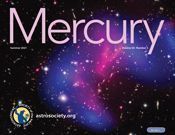Summer 2021 - Volume 50 No. 3

Table of Contents:
[17] Space News
A rundown of some of the most exciting developments in space and time.
[21] A Wealth of Water
Spacecraft visiting the outer planets have revealed multiple planetary objects hold water oceans below their surfaces.
[28] Discovering the Dark Universe
Most of the Universe is undetectable, and yet astronomers have learned an incredible amount about this invisible and mysterious part of the cosmos in the past five decades.
[36] 2021 ASP Awards Announced
The Astronomical Society of the Pacific is proud to announce this year’s awards for astronomy research and education.
Departments:
[3] Perspectives, Liz Kruesi
Awe-Inspiring Research and Astronomers
[4] First Word, Linda Shore
Celebrating Unseen Influences
[6] Annals of Astronomy, Clifford J. Cunningham
Anaxagoras: 2,500 Years Ago
[8] Armchair Astrophysics, Christopher Wanjek
That Ol’ Gamma Moon
[10] Education Matters, Brian Kruse
Interpreting Change
[13] A Little Learning, C. Renée James and Scott T. Miller
This is Not Your Mother’s Astronomy Course
[41] Reflections, Liz Kruesi
Peculiar Galaxies Photographed
************
A Wealth of Water (Feature)
By Nola Taylor Tillman
While Earth is the only blue marble in the Solar System, it is not the only ocean world in our planetary system. The past few decades of planetary science research have revealed an unbelievable wealth of oceans in the Solar System. Several of the moons around the giant planets — like Ganymede, Callisto, Europa, Titan, Enceladus, Mimas — are thought to contain water beneath their rocky and icy crusts.
Discovering the Dark Universe (Feature)
By Liz Kruesi
Humans understand the world around us via observation. Astronomers eventually learned the glowing dots in the night sky are stars, some a few light years away and others far more distant and making up galaxies. Such observations over the centuries have taught us about the Universe and our place within it. But these observations can also reveal what we don’t know — because we cannot see all. And in the past few decades, scientists have learned that everything they can see, all the material they understand and detect, makes up only about 5 percent of the Universe. The remaining 95 percent of the cosmos is dark matter and the even more-mysterious dark energy.
2021 ASP Awards Announced (Feature)
By the staff of the Astronomical Society of the Pacific
The Astronomical Society of the Pacific (ASP) has announced the recipients of its 2021 awards. These awards recognize individual achievements in astronomy research, technology, education, and public outreach each year. Meet this year’s impressive and inspiring awardees.
